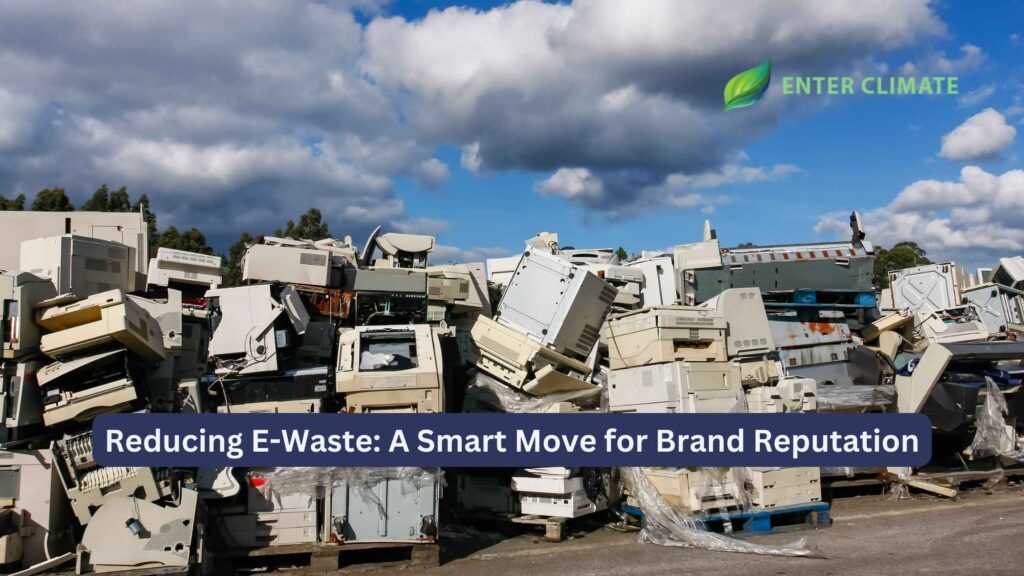As the world becomes more technologically advanced, the consumption of electronic devices continues to rise. While these devices offer convenience and connectivity, they also pose a significant challenge when they reach the end of their life cycle. Electronic waste, commonly known as e-waste, has become a growing environmental concern globally, and businesses are feeling the pressure to address this issue.
However, reducing e-waste is not just about compliance with environmental regulations; it’s also an opportunity for companies to enhance their brand reputation. In today’s world, where consumers are increasingly concerned about environmental sustainability, businesses that adopt responsible E-Waste management practices stand to benefit in terms of customer loyalty, brand image, and long-term success. In this blog, we’ll explore how reducing e-waste can be a smart move for your brand and why it’s essential to implement sustainable practices.
Understanding E-Waste and Its Impact
E-waste refers to discarded electronic devices, such as smartphones, computers, televisions, printers, and other electronic gadgets. These devices often contain valuable metals, plastics, and other materials, but they also pose serious environmental hazards when not disposed of properly.
The impact of e-waste on the environment is significant. When electronics are discarded improperly, harmful substances such as lead, mercury, cadmium, and brominated flame retardants can leach into the soil and water, leading to pollution. Additionally, the global e-waste problem is exacerbated by the fact that many devices contain valuable materials like gold, silver, and copper, which, if recovered properly, could reduce the need for mining and conserve natural resources.
India, as a fast-developing nation, is facing a growing e-waste challenge. The country is one of the largest producers of e-waste in the world. As technology continues to advance and consumer demand for electronic devices increases, so does the volume of electronic waste. Improper e-waste disposal practices, including informal recycling methods that involve burning or breaking down electronics, can have disastrous consequences for both the environment and human health.
How E-Waste Management Enhances Brand Reputation
Responsible E-Waste management is no longer optional for businesses; it is an essential part of a company’s corporate social responsibility (CSR) and sustainability strategy. Here’s how reducing e-waste can help your brand build a stronger reputation:
1. Meeting Consumer Expectations for Sustainability
In today’s world, consumers are becoming more environmentally conscious. They are increasingly aware of the negative impact that e-waste has on the planet and are looking for companies that align with their values. A recent survey found that over 60% of consumers are willing to pay more for products from environmentally responsible companies. By adopting sustainable practices and actively reducing e-waste, businesses can meet these expectations and build a loyal customer base.
When customers see that a brand is making an effort to manage its e-waste responsibly, they are more likely to view that company as environmentally conscious and socially responsible. This positive perception can significantly enhance a brand’s reputation and differentiate it from competitors.
2. Building Trust with Stakeholders
E-waste management is not only important for consumers but also for other stakeholders such as investors, regulatory bodies, and business partners. Companies that adopt responsible e-waste practices demonstrate that they are committed to ethical and sustainable operations. This can strengthen relationships with investors who are increasingly looking for businesses that prioritize sustainability. Similarly, regulatory bodies are placing increasing pressure on companies to comply with e-waste disposal laws and regulations.
By demonstrating compliance with local and international environmental standards, businesses can avoid legal issues and potential fines, while also building trust with stakeholders. Furthermore, businesses that engage in sustainable practices are often viewed as forward-thinking, responsible, and innovative, making them more attractive to partners and investors.
3. Attracting and Retaining Employees
Today’s workforce is becoming more socially and environmentally conscious. Many employees, particularly younger generations, are interested in working for companies that share their values and are committed to making a positive impact on the environment. By taking steps to reduce e-waste and implement sustainable practices, businesses can attract top talent who are passionate about sustainability and want to work for a brand that makes a difference.
4. Boosting Brand Image and Competitive Advantage
In an increasingly competitive business landscape, standing out from the crowd is crucial. Adopting responsible e-waste management practices can provide a competitive edge by positioning your company as a leader in sustainability. When a company prioritizes reducing e-waste, it sends a strong message to consumers, employees, and other stakeholders that it values environmental protection and is dedicated to making a positive impact.
This improved brand image can lead to greater media coverage, word-of-mouth recommendations, and positive reviews, all of which can help grow your customer base and boost sales.
5. Cost Savings Through Efficient Recycling
Responsible e-waste management isn’t just about doing the right thing for the environment; it can also be financially beneficial for your business. Recycling electronics can help recover valuable materials such as gold, silver, and copper, which can be reused in new products. This process can reduce the need for raw materials, lower production costs, and even generate revenue through the sale of recycled materials.
Best Practices for E-Waste Management in Businesses
To effectively reduce e-waste and improve brand reputation, businesses should implement the following best practices:
1. Establish an E-Waste Disposal Policy
Create a clear policy outlining how your business handles e-waste disposal. This policy should include guidelines for the responsible collection, recycling, and disposal of old electronics. Make sure that employees are aware of the policy and encourage them to follow it.
2. Partner with Certified E-Waste Recyclers
Ensure that your company works with certified e-waste recycling partners who follow environmentally responsible practices. Look for recycling facilities that are certified under recognized standards, such as the Responsible Recycling (R2) certification or the e-Stewards certification, which ensures compliance with environmental and ethical recycling practices.
3. Educate Employees and Customers
Education is key to reducing e-waste. Offer training to employees on how to properly dispose of electronics and encourage them to recycle their old devices. You can also engage customers by providing information on how they can recycle their electronics responsibly or offer recycling programs where they can drop off their old devices.
4. Promote Repair and Refurbishing
Instead of disposing of old electronics, businesses can explore opportunities for repair and refurbishing. By extending the lifespan of devices, you can reduce the need for new products and minimize e-waste. Additionally, offering refurbished products as part of your product line can attract environmentally conscious consumers.
5. Adopt a Circular Economy Model
A circular economy model focuses on reusing, refurbishing, and recycling materials to create a more sustainable business model. By implementing a circular economy approach, businesses can significantly reduce e-waste and ensure that products and materials are used to their fullest potential.
Conclusion
Reducing e-waste is not just a matter of environmental responsibility; it is a smart business move that can significantly enhance your brand reputation. Consumers, employees, and stakeholders are increasingly prioritizing sustainability, and businesses that adopt responsible E-Waste management practices are better positioned to meet these demands. By taking proactive steps to reduce e-waste, businesses can strengthen their brand image, build trust, and gain a competitive edge in the marketplace.
Also, read: How to Audit Your Company’s E-Waste Compliance






